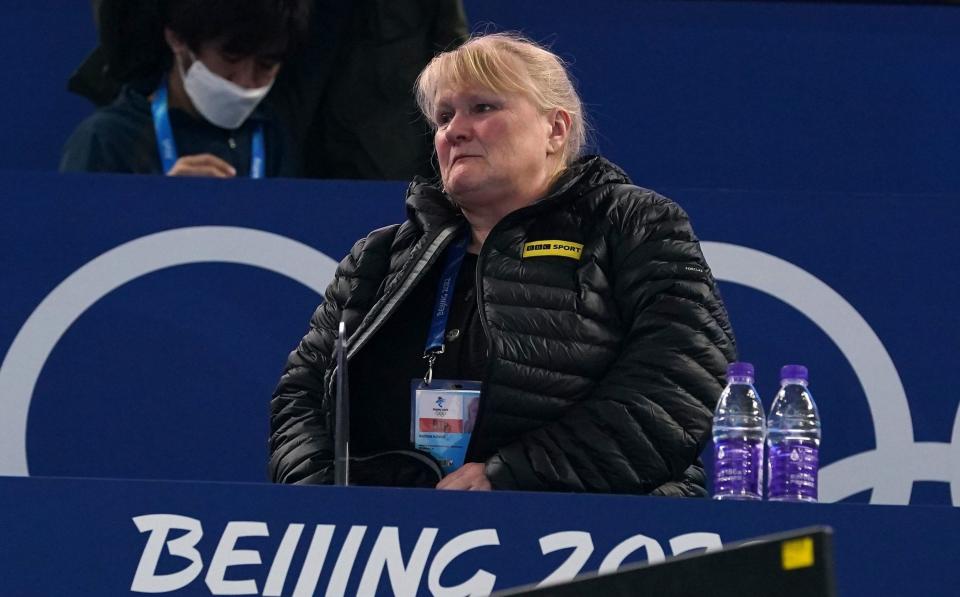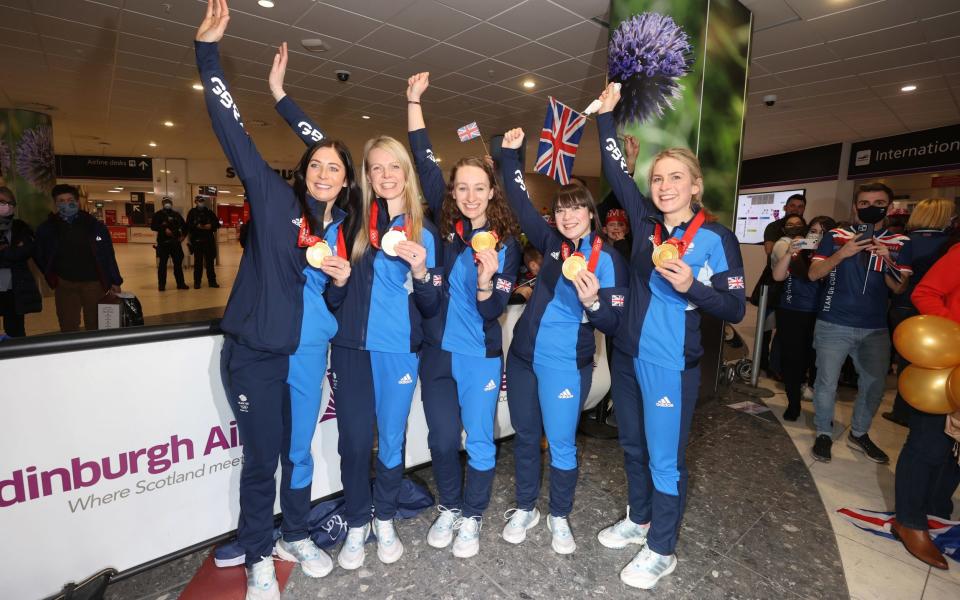How Eve Muirhead and her gold-winning team saved Britain's Winter Olympics, and made curling cool

It was not until she turned into her street in Pitlochry on Tuesday evening that Eve Muirhead was finally struck by the scale of what she had achieved. It had been a long haul back from the Beijing Winter Olympics, where she had skipped the GB curling team to a gold medal. She had barely stood on the podium before she was called to the Bird’s Nest Stadium to take part in the closing ceremony.
From there she dashed straight to the airport for the lengthy overnight flight back to London. Once back in Britain, there was a long day of media interviews and sponsorship engagements, followed by another flight up to Edinburgh, then the drive home. All in all, she reckons she slept for no more than 10 hours across four days. “I’d been living on adrenalin,” she says. “As the car came round the corner all I was thinking was I’m two steps from my own bed. And that’s when it hit me.”
Because there, gathered outside her house, were hundreds of people. Most of Pitlochry seemed to have assembled to welcome back the heroine of the Winter Olympics, the woman who had saved Team GB’s bacon by winning their only gold in the very last moment of competition.
“It was a full-on street party. Everyone was out, the bunting, the balloons, the champagne. Everywhere there were kids telling me they had all been watching me. It was overwhelming. I just hadn’t expected it.” And for Muirhead it brought back poignant memories. She remembers vividly her own response 20 years earlier to the last Briton to skip a team to Olympic gold.
Born into a curling-obsessed family – her father and two brothers have all, at various stages, competed for Britain at the Games – she recalls staying up late as an 11-year-old to watch Rhona Martin (now Rhona Howie) win in Salt Lake City. Even as she watched Martin’s victorious last stone, she told herself that one day she would do the same.
“She was my idol, the woman I always wanted to emulate,” she recalls of Martin. “I remember soon after she came back from the Games seeing her getting into a lift at a sports centre in Perth. I ran down the stairs to beat the lift and meet her when the doors opened, I was that desperate to get her autograph.
“I still get star struck seeing her now. So much of my journey she’s been with me. She was the head coach when I won bronze in Sochi and when I won the World Championships. In Beijing, she was commentating for television and was the first person to congratulate us. She was so emotional. And it meant so much to me, having my absolute hero being that moved by my success.”

Martin was not the only one moved by what Muirhead had achieved. The entire British winter sports operation has much to be grateful to her for, not least for securing future funding. Because her success, right at the last, put an altogether glossier perspective on the Team GB performance in Beijing.
Across the fortnight of the slipping and sliding, the British effort had been a long, dispiriting procession of stumbles and falls, of not quite there and bravely coming in 12th, until she, with characteristic ice-cold precision, slid in the last stone to beat the Japanese in the final. Together with the men’s team that won silver, she rather lifted the mood.
“Of course we were aware it wasn’t going well,” she admits of the Games. “We were really keen to support our other athletes, so we knew what was going on. We’d be training and Hailey [Duff, her team-mate] would tell us ‘quick, the figure skaters are going at 2.17’, and we’d stop what we were doing to watch them on our screens. But honestly, we felt no pressure that we had to medal. You go to the Olympics and have one job to do: perform for your sport. And we did that. For two curling teams to come away with medals is phenomenal. It’s never happened for GB before.”
In truth, it almost did not happen this time. Muirhead and her team had struggled in the early stages of competition, losing twice in the round robin, and needing every permutation to fall into place to qualify for the semi-finals. But she insists she was never worried she might be heading home before the medals were handed out.
“There was no point I thought I’d blown it,” she says. “I kept reminding myself the Olympic competition is like a boiling cauldron, it can bubble over at any point: you’re always in it until the moment you are out. That said, sure, there were times I thought it was going to be hard. But I had in mind the memory of how Rhona did it. She also looked as though she was going out, but pulled through. You could say, we did a repeat of the way she did it.”
Besides Muirhead was not one to back down. This was her fourth Olympics. She took bronze in her second and had lost at the semi-final stage in PyeongChang. The chance finally to emulate her idol was not something she was going to let slip without a scrap. “I look back on the last couple of years and I don’t think I’ve missed one day of training,” she says. “Through lockdown I was in the gym in my garage, freezing in fleecy leggings. On Christmas Day I went for a run, telling myself none of my rivals would be mad enough to go for a run on Christmas Day. I just wanted that Olympic gold so, so bad.”

Her determination was clear in her demeanour. Her blue-eyed stare as she addressed the stone was icy enough to freeze Loch Lomond. Her approach alone has changed the perception of a sport once dismissed as choreographed housework. Nobody looks that magnificently determined when sweeping the front room.
“I hope I have changed the image slightly, made it a bit cooler,” she says. “Certainly all the kids on my street were telling me they were off curling. I love that. I remember in my teens, missing parties, not hanging out with friends to go curling. I used to worry if that was the right thing to do. Now I’ve got the gold, I know it was.”
And now she has achieved her ambition, Muirhead is not sure what she will do next. A scratch golfer, she might play a few rounds. Or she could do a bit of bagpipe playing. “Golf, bagpipes and curling: yeah, I am a right cliche of Scottishness,” she says. But whether she defends her gold medal in Milan in four years time, she is not yet sure. “I’m still struggling to put it all into perspective. I’m not thinking about the long term, I’m going to enjoy the now.” She will, however, be taking part in the Scottish mixed-doubles tournament in Perth starting on 9 March.
“Yeah, I’ll be there. Though I promise you this, I’ll not be stepping on the ice before then,” she insists. “In fact, if anyone sees me anywhere near the ice, they know what to do.”

 Yahoo News
Yahoo News 
